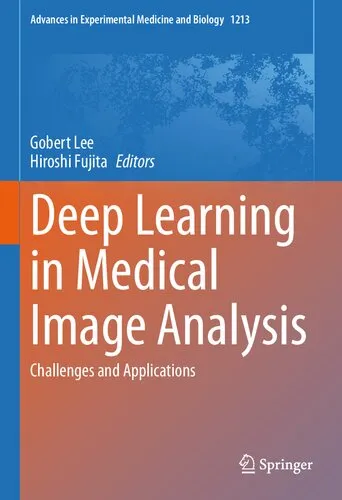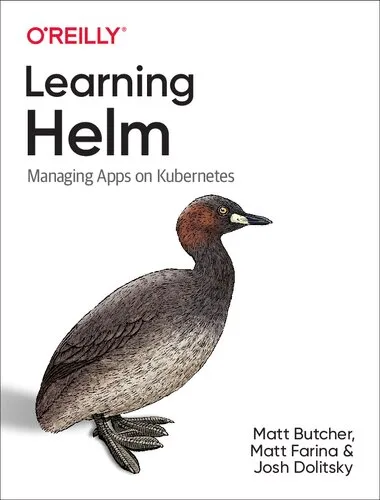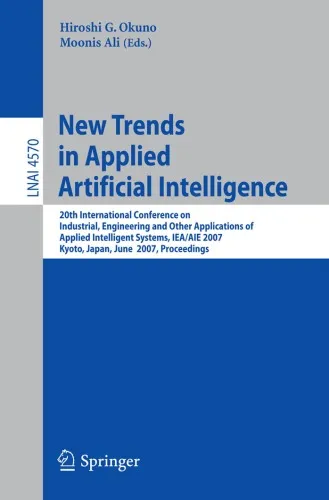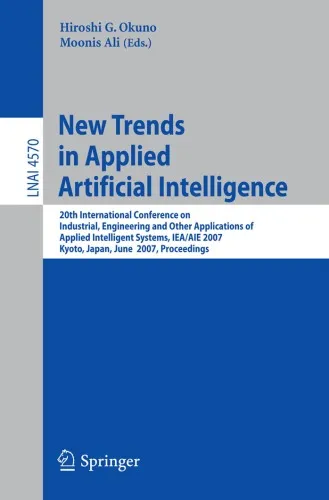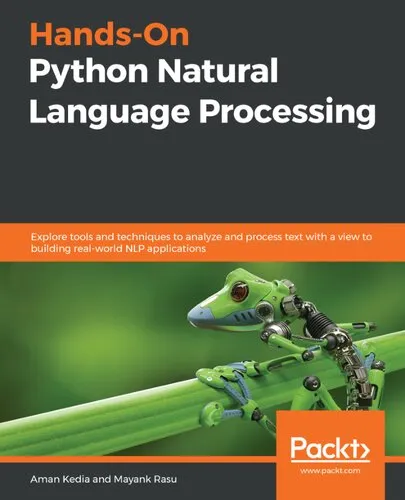Artificial Intelligence in Medical Imaging: Opportunities, Applications and Risks
4.5
بر اساس نظر کاربران

شما میتونید سوالاتتون در باره کتاب رو از هوش مصنوعیش بعد از ورود بپرسید
هر دانلود یا پرسش از هوش مصنوعی 2 امتیاز لازم دارد، برای بدست آوردن امتیاز رایگان، به صفحه ی راهنمای امتیازات سر بزنید و یک سری کار ارزشمند انجام بدینکتاب های مرتبط:
مقدمهای بر کتاب "Artificial Intelligence in Medical Imaging: Opportunities, Applications and Risks"
کتاب Artificial Intelligence in Medical Imaging: Opportunities, Applications and Risks به قلم اریک ر. رانشارت، سرگئی موروزوف و پل ر. آلگرا، یکی از منابع کلیدی و برجسته در زمینه کاربرد فناوری Artificial Intelligence (AI) در حوزه تصویربرداری پزشکی است. این کتاب با رویکردی جامع و علمی، نه تنها فرصتهای بینظیر هوش مصنوعی را در این صنعت به تفصیل بررسی میکند، بلکه چالشها، محدودیتها و ریسکهای این فناوری نوظهور را نیز به تصویر میکشد.
خلاصهای مفصل از کتاب
کتاب با تمرکز بر گسترش دانش مخاطبان در زمینه کاربردهای Artificial Intelligence در تصویربرداری پزشکی آغاز میشود. نویسندگان با ارائه توضیحات دقیق و مثالهای عملی، از چگونگی استفاده از الگوریتمهای یادگیری ماشین (Machine Learning) و یادگیری عمیق (Deep Learning) در بهبود فرآیندهای تشخیصی، پیشبینی بیماریها و مدیریت دادهها صحبت میکنند. علاوه بر این، کتاب به جنبههای اخلاقی، قانونی و قابل اطمینان بودن فناوری در این حوزه میپردازد و مشکلات احتمالی مربوط به پیادهسازی AI در محیطهای پزشکی را بررسی میکند.
از دیگر بخشهای برجسته این کتاب، تحلیل موارد کاربردی عملی از استفادههای AI در سیستمهای بهداشتی است. نویسندگان با استفاده از زبان ساده و در عین حال تخصصی، نحوه ادغام این تکنولوژی با روشهای کنونی تصویربرداری مثل MRI، CT و X-ray را مورد بررسی قرار میدهند.
نکات کلیدی و آموزههای کتاب
- معرفی انواع الگوریتمهای Artificial Intelligence و روش استفاده از آنها در تحلیل تصاویر پزشکی.
- تأثیر تحلیلهای مبتنی بر Deep Learning در ارائه تشخیصهای دقیقتر و سریعتر.
- بررسی چالشهای موجود نظیر موضوعات اخلاقی، مسائل قانونی و خطرات مرتبط با پذیرش فناوری AI در تصویربرداری پزشکی.
- تشریح روشهای عملی ادغام Machine Learning با فرآیندهای فعلی پزشکی.
- بررسی مطالعات موردی واقعی و کاربردپذیری این تکنولوژیها در مراکز درمانی و خدمات سلامتی.
نقلقولهای برجسته از کتاب
“The future of medical imaging lies in the seamless synergy of Artificial Intelligence and human expertise.”
“While Artificial Intelligence can revolutionize medical imaging, its success depends on the trust, transparency, and collaboration between clinicians, engineers, and policymakers.”
“Incorporating AI into medical imaging isn't about replacing radiologists; it's about empowering them to make smarter, faster, and better-informed decisions.”
چرا این کتاب اهمیت دارد؟
با گسترش روزافزون فناوریهای Artificial Intelligence در صنایع مختلف، پزشکی و به طور خاص تصویربرداری پزشکی یکی از بزرگترین حوزههای تحت تأثیر این پیشرفت است. این کتاب ابزاری گرانقدر برای پزشکان، متخصصان تصویربرداری، دانشجویان پزشکی و حتی نوآوران فناوری محسوب میشود که به دنبال درک عمیقتر از نقشی که AI در آینده این صنعت ایفا خواهد کرد، هستند.
کتاب با ارائه بینشی تازه و متفاوت نه تنها به متخصصان پزشکی بلکه به مهندسان و سیاستگذاران نیز کمک میکند تا درک یکپارچهای از فرصتها و چالشهای موجود در استفاده از سیستمهای هوشمند داشته باشند و مسیر بهتری برای پیادهسازی این فناوری تعیین کنند. خواندن این اثر، روشنگر دیدگاههایی نوین درباره نحوه ترکیب نیروی انسانی و هوش ماشین و بهبود مراقبتهای بهداشتی است.
Introduction to Artificial Intelligence in Medical Imaging: Opportunities, Applications and Risks
The field of medical imaging is undergoing a transformative revolution, driven by the rapid advancements in artificial intelligence (AI) technologies. Artificial Intelligence in Medical Imaging: Opportunities, Applications and Risks serves as a comprehensive guide to understanding how AI is reshaping the landscape of imaging diagnostics, treatment planning, and patient care. This book dives deeply into the potential benefits, practical applications, ethical implications, and possible risks associated with integrating AI into medical imaging workflows.
Written by experts Erik R. Ranschaert, Sergey Morozov, and Paul R. Algra, this book combines scientific rigor with practical insights, making it an invaluable resource for radiologists, healthcare professionals, policy makers, and data scientists. Each chapter is crafted to offer an in-depth exploration of how AI technologies—including machine learning, deep learning, and computer vision—are paving the way for innovations in radiology, while also addressing the challenges of adoption and implementation. Whether you're intrigued by the promise of autonomous AI systems or concerned about their ethical ramifications, this book provides the information you need to navigate this exciting field responsibly.
Detailed Summary of the Book
The book is divided into well-structured sections that guide the reader through the different aspects of AI in medical imaging, starting with a foundation of what AI entails and evolving to more complex discussions of its presence and implications in healthcare.
- Foundations of Artificial Intelligence: The beginning chapters provide a concise yet thorough introduction to AI concepts, types of machine learning, and how these technologies apply to image processing in clinical settings.
- Key Applications in Radiology: This section discusses how AI is applied to improve diagnostic accuracy, automate mundane tasks, and predict patient outcomes, with examples from real-world clinical cases.
- Ethical and Regulatory Challenges: The book delves into the risks posed by AI algorithms, from data privacy issues to algorithmic bias and the potential for misuse.
- Clinical Integration and Adoption: Practical advice for radiologists and administrators on how to incorporate AI tools into existing workflows effectively while fostering collaboration among key stakeholders.
Key Takeaways
Here are some of the most important insights you'll gain from this book:
- AI as a Collaborative Tool: AI is not a replacement for radiologists but a powerful augmentation tool. Human expertise remains critical in interpreting results and solving complex cases.
- Improved Efficiency: AI can handle repetitive tasks and large volumes of data, freeing up radiologists to focus on cases requiring deeper analysis.
- Risks and Limitations: Despite its promise, AI faces challenges such as biased datasets, lack of transparency in algorithm design, and regulatory hurdles.
- The Need for Collaboration: Interdisciplinary partnerships—between clinicians, engineers, and policymakers—are essential for the ethical and effective deployment of AI in medical imaging.
Famous Quotes from the Book
The book is rich with thought-provoking quotes that highlight the opportunities and critical issues in applying AI to medical imaging. Below are a few notable examples:
"Artificial intelligence has the potential to transform radiology, not by replacing radiologists, but by expanding what is humanly possible in imaging diagnostics."
"As we develop AI tools, we must remember that our ultimate responsibility is to the patient, ensuring their safety, privacy, and trust."
"The future of radiology lies in collaboration—between humans and machines, between technologists and healthcare providers, and between innovation and ethics."
Why This Book Matters
With AI poised to revolutionize healthcare, particularly in the field of medical imaging, this book is an essential primer for anyone involved in this evolving domain. The authors provide a balanced perspective by celebrating innovation while critically examining the challenges and risks that come with it.
Medical imaging professionals, policy makers, and data scientists will find invaluable insights and actionable advice within these pages. Beyond the technical content, the book emphasizes the importance of ethics, equity, and collaboration, ensuring that AI serves as a force for good in medical practice. It bridges the gap between theoretical knowledge and practical application, making it relevant for both technical and non-technical readers interested in the intersection of AI and healthcare.
As the field of radiology continues to evolve alongside advancements in artificial intelligence, Artificial Intelligence in Medical Imaging: Opportunities, Applications and Risks ensures that readers are equipped to embrace the opportunities while responsibly navigating the challenges. In an era of rapid technological progress, this book provides the clarity and guidance necessary to harness the true potential of AI in transforming patient care.
دانلود رایگان مستقیم
شما میتونید سوالاتتون در باره کتاب رو از هوش مصنوعیش بعد از ورود بپرسید
دسترسی به کتابها از طریق پلتفرمهای قانونی و کتابخانههای عمومی نه تنها از حقوق نویسندگان و ناشران حمایت میکند، بلکه به پایداری فرهنگ کتابخوانی نیز کمک میرساند. پیش از دانلود، لحظهای به بررسی این گزینهها فکر کنید.
این کتاب رو در پلتفرم های دیگه ببینید
WorldCat به شما کمک میکنه تا کتاب ها رو در کتابخانه های سراسر دنیا پیدا کنید
امتیازها، نظرات تخصصی و صحبت ها درباره کتاب را در Goodreads ببینید
کتابهای کمیاب یا دست دوم را در AbeBooks پیدا کنید و بخرید
1234
بازدید4.5
امتیاز0
نظر98%
رضایتنظرات:
4.5
بر اساس 0 نظر کاربران
Questions & Answers
Ask questions about this book or help others by answering
No questions yet. Be the first to ask!
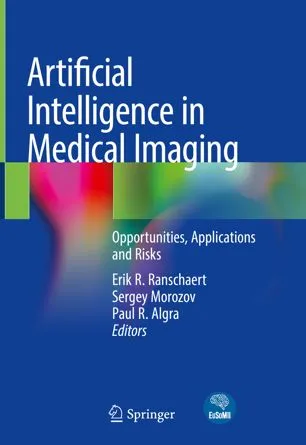

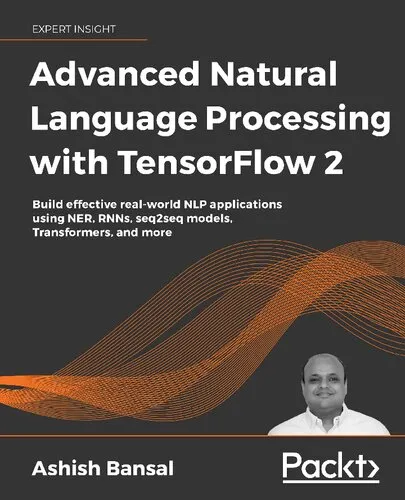
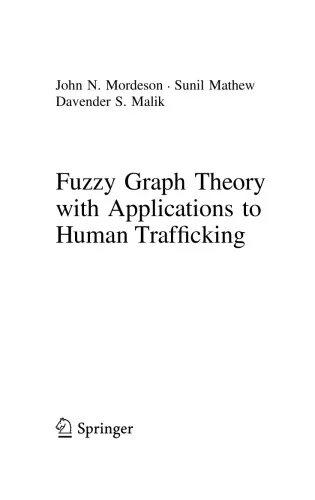


![Building Data Science Applications with FastAPI: Develop, manage, and deploy efficient machine learning applications with Python [Team-IRA]](https://s3.refhub.ir/images/thumb/Building_Data_Science_Applications_with_FastA_31328.webp)

